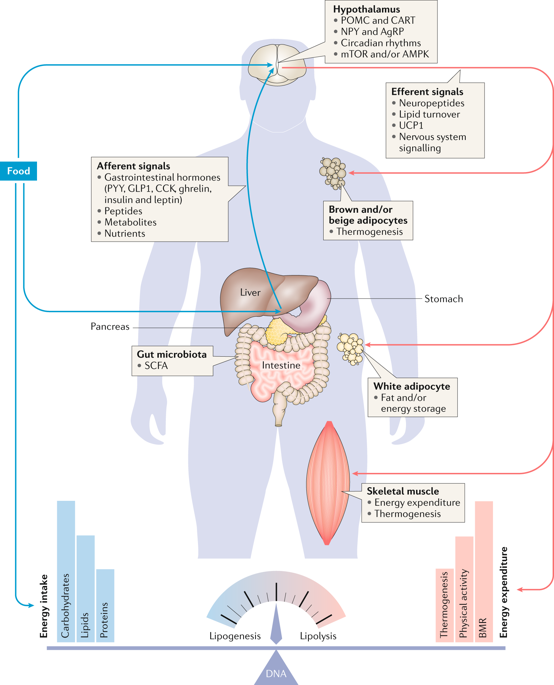当前位置:
X-MOL 学术
›
Nat. Rev. Endocrinol.
›
论文详情
Our official English website, www.x-mol.net, welcomes your
feedback! (Note: you will need to create a separate account there.)
Contribution of macronutrients to obesity: implications for precision nutrition.
Nature Reviews Endocrinology ( IF 31.0 ) Pub Date : 2020-03-31 , DOI: 10.1038/s41574-020-0346-8 Rodrigo San-Cristobal 1 , Santiago Navas-Carretero 2, 3, 4 , Miguel Ángel Martínez-González 3, 4, 5, 6 , José María Ordovas 7, 8, 9 , José Alfredo Martínez 1, 2, 3, 4
Nature Reviews Endocrinology ( IF 31.0 ) Pub Date : 2020-03-31 , DOI: 10.1038/s41574-020-0346-8 Rodrigo San-Cristobal 1 , Santiago Navas-Carretero 2, 3, 4 , Miguel Ángel Martínez-González 3, 4, 5, 6 , José María Ordovas 7, 8, 9 , José Alfredo Martínez 1, 2, 3, 4
Affiliation

|
The specific metabolic contribution of consuming different energy-yielding macronutrients (namely, carbohydrates, protein and lipids) to obesity is a matter of active debate. In this Review, we summarize the current research concerning associations between the intake of different macronutrients and weight gain and adiposity. We discuss insights into possible differential mechanistic pathways where macronutrients might act on either appetite or adipogenesis to cause weight gain. We also explore the role of dietary macronutrient distribution on thermogenesis or energy expenditure for weight loss and maintenance. On the basis of the data discussed, we describe a novel way to manage excessive body weight; namely, prescribing personalized diets with different macronutrient compositions according to the individual's genotype and/or enterotype. In this context, the interplay of macronutrient consumption with obesity incidence involves mechanisms that affect appetite, thermogenesis and metabolism, and the outcomes of these mechanisms are altered by an individual's genotype and microbiota. Indeed, the interactions of the genetic make-up and/or microbiota features of a person with specific macronutrient intakes or dietary pattern consumption help to explain individualized responses to macronutrients and food patterns, which might represent key factors for comprehensive precision nutrition recommendations and personalized obesity management.
中文翻译:

大量营养素对肥胖的贡献:对精准营养的影响。
消耗不同的产生能量的常量营养素(即碳水化合物、蛋白质和脂质)对肥胖的特定代谢贡献是一个积极争论的问题。在这篇综述中,我们总结了当前关于不同常量营养素摄入与体重增加和肥胖之间关联的研究。我们讨论了对可能的不同机制途径的见解,其中常量营养素可能作用于食欲或脂肪生成以导致体重增加。我们还探讨了膳食常量营养素分布对减肥和维持产热或能量消耗的作用。在讨论的数据的基础上,我们描述了一种管理体重过重的新方法;即,根据个体的基因型和/或肠型开具具有不同常量营养素成分的个性化饮食。在这种情况下,大量营养素消耗与肥胖发病率的相互作用涉及影响食欲、产热和新陈代谢的机制,这些机制的结果会因个体的基因型和微生物群而改变。事实上,具有特定宏量营养素摄入或饮食模式消费的人的基因构成和/或微生物群特征的相互作用有助于解释对宏量营养素和食物模式的个体化反应,这可能是全面精准营养建议和个性化肥胖的关键因素管理。
更新日期:2020-03-31
中文翻译:

大量营养素对肥胖的贡献:对精准营养的影响。
消耗不同的产生能量的常量营养素(即碳水化合物、蛋白质和脂质)对肥胖的特定代谢贡献是一个积极争论的问题。在这篇综述中,我们总结了当前关于不同常量营养素摄入与体重增加和肥胖之间关联的研究。我们讨论了对可能的不同机制途径的见解,其中常量营养素可能作用于食欲或脂肪生成以导致体重增加。我们还探讨了膳食常量营养素分布对减肥和维持产热或能量消耗的作用。在讨论的数据的基础上,我们描述了一种管理体重过重的新方法;即,根据个体的基因型和/或肠型开具具有不同常量营养素成分的个性化饮食。在这种情况下,大量营养素消耗与肥胖发病率的相互作用涉及影响食欲、产热和新陈代谢的机制,这些机制的结果会因个体的基因型和微生物群而改变。事实上,具有特定宏量营养素摄入或饮食模式消费的人的基因构成和/或微生物群特征的相互作用有助于解释对宏量营养素和食物模式的个体化反应,这可能是全面精准营养建议和个性化肥胖的关键因素管理。











































 京公网安备 11010802027423号
京公网安备 11010802027423号